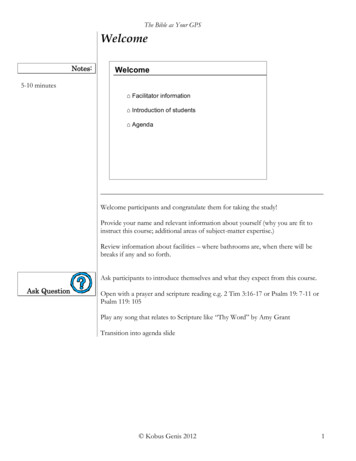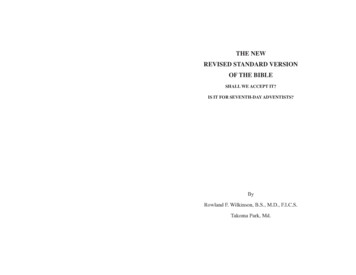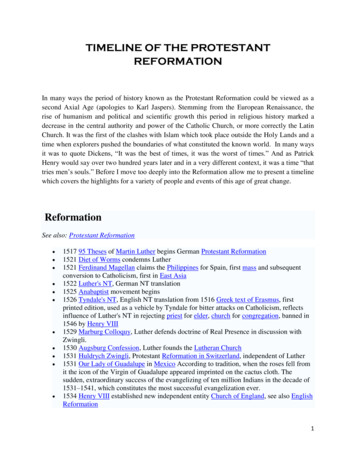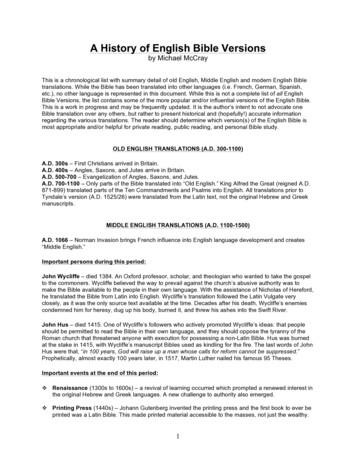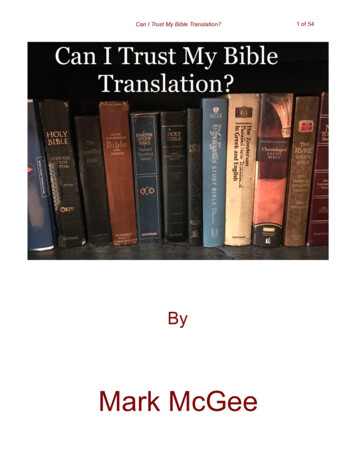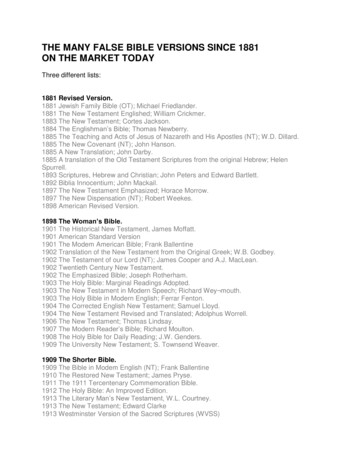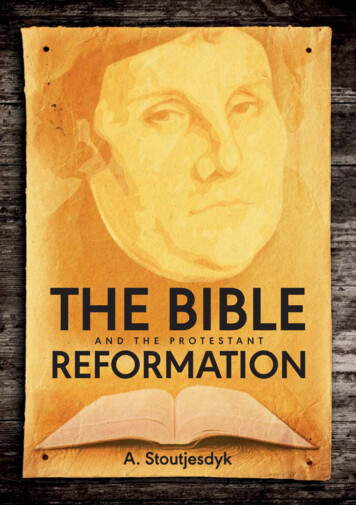
Transcription
THE BIBLEA N DT H EP R OT E S TA N TREFORMATIONA. Stoutjesdyk
THE BIBLEA N DT H EP R OT E S TA N TREFORMATIONTrinitarian Bible Society
The Bible and the Protestant ReformationProduct Code: A129ISBN: 978 1 86228 068 7 2017Trinitarian Bible SocietyWilliam Tyndale House, 29 Deer Park RoadLondon SW19 3NN, EnglandRegistered Charity Number: 233082 (England) SC038379 (Scotland)Copyright is held by the Incorporated Trinitarian Bible Society Truston behalf of the Trinitarian Bible Society
Table of ContentsSome comments to the reader21Commemoration commanded32Growing up in a dark place and a dark time53Seeking in the darkness64Brought to the light95Helping the light shine forth106The Bible and the Wartburg167‘The entrance of thy words giveth light’178Commemoration and lamentation199Appendix A: The ‘wild boar in the vineyard’2210Appendix B: Luther and the Peasants’ War23
The Bible Some comments to the readerIt’s impossible for a simple booklet to cover all aspects of theReformation. This booklet is about the way in which the earlyReformation restored the Bible to its rightful place in church worship,family devotions—indeed, in ‘all things that pertain unto life andgodliness’ (2 Peter 1.3). The main text tells us that story.In order to increase the ease of reading and understanding, additionalrelated material has been placed outside of the main text in eithertextboxes or the two appendices. While this additional materialfleshes out the theme and contains a few of the answers to theSociety’s Reformation Puzzles, reading only the main text will giveyou an understanding of the topic.While reading this pamphlet may whet your appetite for learningmore about the Reformation, I hope above all that it will increaseyour awe for the wonderful way in which the Lord delivered Hischurch from the house of bondage and returned His Word to its placeon the candlestick of truth. If that hope is fulfilled, the Reformationwill not just be an historic event from the distant past but a livinglegacy for the present.Adrian StoutjesdykGeneral Secretary, TBS (Canada)Rosedale, BC, Canada2
and the Protestant ReformationTHE BIBLEA N DT H EP R OT E S TA N TREFORMATIONAdrian Stoutjesdyk1Commemoration CommandedA few candles on a child’s birthday cake give both light and warmth. Imagine howmuch light five hundred candles would give!No, I’m not suggesting we make a giant birthday cake with five hundred candlesto commemorate the Reformation’s quincentennial. Still, the birthday cake andcandles imagery has some value. Did not the start of the Reformation, whichis often dated from 31 October 1517, shine a bright light into dark places anddarkened hearts? Even a child can blow out the candles on his cake; but despiteall his huffing and puffing Satan has not been able to blow out the light ignited bythe Reformation. In His providence, the Lord used the reformers to again set Hisholy Word, that ‘more sure word of prophecy’ of which Peter writes, as ‘a light thatshineth in a dark place’ (2 Peter 1.19).But do we really have to commemorate something from five hundred years ago?Yes, especially because the Lord in His Word commands His people to mark3
The Bible signal deliverances. In Joshua 4 twelve men are told to take twelve large stonesfrom the middle of the River Jordan, carry them to the shore, and stack themto make a memorial cairn. Why did the Lord tell Joshua to do this? The Lordgives the reason: ‘That this may be a sign among you, that when your childrenask their fathers in time to come, saying, What mean ye by these stones? Thenshall ye answer them, That the waters of Jordan were cut off before the ark of thecovenant of the LORD; when it passed over Jordan, the waters of Jordan were cutoff: and these stones shall be for a memorial unto the children of Israel for ever’(Joshua 4.6–7).During the sixteenth century the Lord led His church back to the Holy Bible. HisScriptures, showing the way by which the chief of sinners can be saved, showedthem the right way to worship and the way to live their daily lives. His Word shapedthe laws of nations, and established the sanctity of marriage and the importance ofthe family. His Word stressed the need for basic education, and gave guidelines forvirtually every human activity. Let’s adapt a short line from Joshua 4: What meanyou by commemorating the Reformation five hundred years after Luther posted theNinety-five Theses? We hope that this booklet will help you answer the question sothat you can join in with the parents of Joshua’s day: ‘that all the people of the earthmight know the hand of the LORD, that it is mighty: that ye might fear the LORDyour God for ever’ (Joshua 4.24).Did Martin Luther start the Reformation? No, the Lord did. Earlier reformers suchas John Wycliffe and John Huss had blazed across the sky of the church like brightbut short-lived comets. But now the Lord’s appointed time had come, and in Hisinscrutable counsel He further prospered the work of Luther and the reformers ofhis generation.However, this booklet is not about the importance of Luther (although wewill see how the Lord greatly used him). Rather, it’s about the Lord’s work inreturning the Holy Scriptures to their rightful place in divine worship; it’sabout the Lord’s grace in showing His people the way of salvation only by truefaith in His Son, the Lord Jesus Christ. The Lord worked the Reformation. Itwas His gift to a people that walked in darkness. Surely it is an event worthremembering!4
and the Protestant Reformation2Growing up in a dark place and a dark timeA peasant’s sonMartin Luther was the son of Hans andMargaretha Luther. He was born on10 November 1483 in the small villageof Eisleben. The family soon moved toMansfeld. Father Hans Luther was a copperminer. His son Martin readily admitted hishumble beginnings: ‘I am a peasant’s son;my grandfather and my great-grandfatherwere genuine peasants’. Luther knewhis parents loved him but their harshdiscipline left a painful impression thataffected him throughout his life.His parents could afford to send him toschool. Father Hans wanted his son tostudy law because that would help his sonfind a high position working for one of therulers of Germany.1497 – Starts school in Magdeburg1498 – Goes to school in Eisenach1501 – Enrols at University of ErfurtNothing in Luther’s parentage, youth,or education set him off from hiscontemporaries or explains why he laterrevolted against much of the acceptedforms of medieval religion.We have Bibles in our homes. Lutherdid not. He grew up in a home full ofsuperstitious beliefs. His parents couldafford to send him to school and religionwas doubtless involved, but the teachingsof the Bible were not a part of hiseducation.Why did few homes have a Bible duringthe Middle Ages? First, few people outsideof the monasteries could read. Second,before the invention of the printingpress Bibles were scarce and expensivebecause all copies had to be handwritten.Third, while the local priests did readsmall portions of the Bible during churchservices, they read from a Latin version ofthe Bible; few people would have been ableto understand the priest’s reading.The most important reason is thatthe Church of Rome did not want theordinary people to have access to a Bible,especially to one in their own language.The church taught that the commonpeople could not understand the Bible.Of course, the church leaders knew that aBible-reading people would see throughthe errors, superstitions, and corruptionsof the Roman Catholic church. Givingthe people the Bible would endanger thepower, wealth and prestige of the priests,bishops, cardinals and popes. So how5
The Bible did medieval people worship? Not by studying the Bible or listening to Bible-truesermons but by participating in many duties and rites invented by men.In 1504, when Luther was twenty years old, he found a Latin translation of the Biblein the library of the University of Erfurt. Yes, Luther saw religiosity everywhere: hesaw church spires stretching toward the sky, heard church bells pealing at set times,and smelled the incense wafting upward from the censers. But he had never seen awhole Bible. And he was twenty-years old!Luther often returned to that Bible on the dusty library shelves. He found so manypages, so many chapters, so many Bible books that he had not met during the firsttwenty years of his life. Did reading in the Latin Vulgate Bible work a change inLuther? We don’t know. Perhaps he read it only with his head and not with hisheart, just as we often do. The Bible is very, very important but Luther and all menneed the Holy Spirit to teach us how to read God’s Word—and how to be read bythat Word!3Seeking in the darknessA thunderstorm completely changed Luther’s life. One day while walking homefrom a visit to his parents, he saw black clouds gathering overhead. Soon it began tothunder and lightning in an awful way. Then a lightning bolt fell at his feet and theair pressure hurled him to the ground.Terrified that he was about to die, LutherHowbeit in vain do they worshipcried out, ‘St Anne, save me and I willme, teaching for doctrines theenter a monastery!’commandments of men. Mark 7.7Is this the outcry of the great reformer?He calls to St Anne. The Bible tells usthat neither St Anne nor any other person—or even ‘saint’—can hear Luther; theycan’t help him. Praying to the saints is a form of idolatry. Notice, too, his belief inmonasticism, that there is eternal value in living an ascetic life in a monastery. No,at this point in time Luther is not at all reformed; he does not yet understand thedoctrine of solus Christus. Just like his peers he prayed to the Virgin Mary and otherso-called saints rather than praying directly to God.6
and the Protestant ReformationHis vow to St Anne and anxiety abouthis soul brought him to the door of theAugustinian monastery in Erfurt. Here hisdays were filled with religious exercisesdesigned to bring peace to the soul. Lutherfully believed that obeying the monasteryrules carefully and performing his religiousduties seriously would please God andbring salvation to his soul by satisfying thedemands of God’s just law. He lived hismonastic life with an intensity that wentLuther at the door of Erfurt monasteryfar beyond the strict requirements, andwore himself out with prayer and fasting. He also wore his superiors out with hislong and frequent confessions. Luther knew he was a sinner but could find neitherforgiveness nor peace anywhere. Of this time He wrote:I was a good monk, and I kept the rule of my order so strictly that I maysay that if ever a monk got to heaven by his monkery, it was I. All mybrothers in the monastery who knew me will bear me out. If I had kepton any longer, I would have killed myself with vigils, prayers, reading,and other work.1However, walking the road of duties and self-improvement brought Luther nopeace. He looked like a corpse: his eyes sunken in, his bones sticking out, his bodybowed down to the earth, his tears watering the ground, and his groans annoyinghis easy-going brother monks who understood little of spiritual troubles.Yes, Luther read and re-read the Bible in the monastery library. He could not leaveit alone, even though reading it brought him no peace. Because his understandinghad not yet been enlightened, he did not understand the Word rightly. Indeed, hefound only condemnation.The church of his time taught that salvation was partly by the finished work ofChrist and partly by man’s good works. In other words, Luther thought he had toearn a part of his righteousness before God. However, he soon learned that hisworks could not satisfy the justice of God.7
The Bible I felt that I was a sinner before God with an extremely disturbed conscience.I could not believe that He was placated by my satisfaction. I did not love,yes, I hated the righteous God who punishes sinners, and secretly, if notblasphemously, certainly murmuring greatly, I was angry with God Thus I raged with a fierce and troubled conscience. Nevertheless, I beatimportunately upon Paul at that place (Romans 1.17) most ardently desiringto know what St. Paul wanted.21510: The trip to RomeIn order to resolve an administrativedispute in the Augustinian order, in 1510Staupitz sent Luther and another monkto Rome. Luther took little interest in theart treasures of the papal city. Instead,he used his spare time to confess to localpriests, celebrate mass, visit the catacombsand venerate the bones and shrines of thesaints.He also climbed Pilate’s stairs on his kneesand said a prayer on each step because itwas thought that this would release a soulfrom purgatory. At the top of the stairs, heexclaimed, ‘Who knows whether it is so?’Doubt in the saving power of Romanistrituals had entered his mind.Luther knew he was a sinner; he knewabout the severity of God’s justice but hehad no understanding of true salvationthrough faith in Christ Jesus. Indeed, hethought it most unfair of God to requirefrom him a righteousness which he couldnever attain.Happily, the Lord provided Luther witha man who could guide him to the truth.Johann von Staupitz was the head of theAugustinian order of monks to whichLuther belonged. His first efforts to guideand console Luther failed. However, hedid recognise that Luther was a man withunusual gifts.In 1513 Staupitz took Luther aside andordered him to teach Bible at the newUniversity of Wittenberg, just recentlyfounded by Frederick the Wise, theElector of Saxony. Luther protestedvehemently. But Staupitz insisted; heknew that studying the Bible thoroughly as he prepared his lessons would helpLuther. In the providence of God, by compelling his younger colleague to studyand teach Bible Staupitz forced Luther to turn to Scripture to look for an answerfor his problems.The ignorance, incompetence and levity ofthe priests and monks in Rome shockedhim and moved him further toward thetruth.8
and the Protestant Reformation4Brought to the lightLuther first lectured on the Psalms. When he reached Psalm 31, he could getno further than the first verse: ‘deliver me in thy righteousness’. What does thatword righteousness really mean? Does this word mean that the sinner has to berighteous? Luther had already learned that this was impossible. He searched andstudied other Bible texts that included the word righteousness.Then, as he agonized over Romans 1.17—‘For therein is the righteousness of Godrevealed from faith to faith: as it is written, The just shall live by faith’, the Lordlifted the veil from his eyes. Now he saw that righteousness in the New Testamentwas not the punitive righteousness of God. Instead the Scriptures teach thatsubstitutionary and forgiving mercy is merited by the suffering of Christ andChrist’s righteousness is imputed to the repentant sinner. Later Luther wrote,‘When I realized this, I felt myself absolutely born again. The gates of paradise hadbeen flung open and I had entered. There and then the whole of Scripture tookon another look to me’.3 Sola fide (by faith alone) and sola gratia (by grace alone)are two of the most important and living legacies of the Reformation. Justificationis not something man has to earn; it is a divine gift by which God declares theunrighteous righteous through Christ.Luther summed up his breakthrough into the light in a little poem.Lord Jesus,Thou art my righteousness,I am thy sin.Thou tookest upon Thee what was mine;yet set on me what was Thine.Thou becamest what Thou wert not,that I might become what I was not.4This poem captures the essence of the Gospel and this moment marks thebeginning of the Reformation. For over a thousand years the church had beengrowing farther and farther away from the Gospel. Indeed, the church hardlyunderstood the Gospel any more. Now the whole of Scripture took on a new9
The Bible meaning for Luther. Paul’s words in Romans 1 became the gate to heaven. NowLuther understood that the suffering of Christ on the cross made it possible forrighteousness and peace to kiss each other. It was at this moment that the Biblebegan to return to its rightful place, giving light as on a candlestick.What would Luther think of modernEnglish translations of Revelation 19.8?Here the Word of God tells us that thesaints will ‘be arrayed in fine linen,clean and white: for the fine linen is theRomans 5.1righteousness of saints’. Now compare thephrase in bold with the wording found inmany modern Bible versions used today. According to these, fine linen is (or standsfor) the ‘righteous acts’ of the saints.Therefore being justified byfaith, we have peace withGod through our LordJesus Christ.Luther would have objected strenuously to such a translation. The Lord hadtaught him that he had no righteous acts to commend him to God’s favour; hisown righteousness was no more than filthy rags. Luther needed to have Christ’srighteousness wrapped about him just as a fine linen garment is wrapped aroundthe shoulders of a human body, as the prophet Isaiah so aptly describes it (61.10).Christ’s imputed righteousness is the only justifying righteousness of the saints.5Helping the light shine forthOf course, Luther’s experience changed his university lectures and his parishsermons. Now that he knew the only way of salvation he could not keep it tohimself. Could he allow his people to continue on the way of deceitful error?His messages reflected his own spiritual experiences. Students crowded into hislecture room and even fellow professors came to sit at his feet. His animatedpreaching and the majesty of the truths he proclaimed in a church in Wittenbergcaptivated the hearts and awed the consciences of his hearers. Now he proclaimedpardon and heaven, not as indirect compensation administered through the priestsfor good works, but as a direct gift from God. Clearly, Luther’s words had theirbirthplace not on his lips but in his soul.510
and the Protestant ReformationLuther was also a parish priest. He was responsible for the spiritual welfare of hispeople. Most of them were being led astray. Luther had learned from experiencethat the superstitious rites of Rome could not save his soul. Could he then allow hispeople to be deceived by those rites?The Roman Catholic Church taught that even those who lived most strictly wouldhave to spend some time in a place of cleansing by fire. This place was calledpurgatory. Hell was reserved for thedamned; but purgatory would be thetemporary after-death destination foralmost everyone, and in the MiddleAges people feared purgatory more thanThe key teachings of Luther and thethey feared hell. Medieval man wasother reformers are often summarisedterrified of the sufferings of purgatoryin five points.which might last for thousands of years.Sola Scriptura: only the BibleHowever, the church had found a waySola Fide:only by faithto shorten the stay in that dismal abode,and the people grasped at any way ofSola Gratia:only by graceshortening their time in torment. ASolus Christus: only by Christtroubled medieval person could buy anSoli Deo Gloria: only to God’s gloryindulgence to shorten his stayin purgatory.The Solas of theReformationIn overly simplified terms, an indulgence is an official statement purchased from thechurch which was supposed to reduce time in purgatory. You could buy indulgencesfor yourself, and also for relatives and friends who had already died and gone intopurgatory. Selling indulgences was a profitable business, and was a huge source ofincome to the church. At the time both the pope and a German archbishop badlyneeded money, and to raise this money they approved the sale of indulgences insome parts of Germany.An eloquent monk and high pressure salesman named Tetzel peddled indulgencesin a shameless manner. He would sketch before his audience the agonies ofpurgatory and assure them of the effectiveness of an indulgence. His language reallyplayed on people’s emotions.11
The Bible Listen to the voices of your dear dead relatives and friends, beseeching youand saying, ‘Pity us, pity us. We are in dire torment from which you canredeem us for a pittance’. Do you not wish to? Open your ears! Hear thefather saying to his son, the mother to her daughter, ‘We bore you, nourishedyou, brought you up, left you our fortunes, and you are so cruel and hardthat now you are not willing for so little to set us free. Will you let us lie herein flames? Will you delay our promised glory?’6Tetzel even used a clever little commercial jingle.As soon as the coin in the coffer rings,The soul from purgatory springs.Many believed this carefully orchestrated sales pitch. Although the ElectorFrederick forbad Tetzel from entering his territory, the indulgence hawker visitedneighbouring towns. Some of the people from Wittenberg travelled to these placesand bought indulgences. But what could Luther do about it?In 1516 Luther did not yet have a clear and full understanding of Biblicaltheology. However, he did have serious misgivings about indulgences and spokeout against them in two of his sermons. He feared that buying indulgence lettersgave people a false sense of security and made them think lightly of sin. Indeed,many saw an indulgence certificate as a blank cheque to do what they pleasedwithout troubling their conscience. Indulgences would make true repentanceunnecessary.During 1517 Luther became convinced that he, a pastor and professor, must notallow his people to be misled; he had to speak out against this misleading abuse.He wrote his concerns about indulgences and some other abuses of the church ona large sheet of stiff paper in ninety-five statements or theses. Then he took a malletand some tacks and nailed his placard to the door of the church. Those hammertaps were like a seismic shock that shook the whole world of medieval Catholicism.Within weeks translated and printed copies of the Ninety-five Theses reached nearlyevery part of western Europe. Soon like-minded men in England, Scotland, France,Switzerland and the Netherlands began to speak out against the abuses and errorsof the church.12
and the Protestant Reformation1.A few of theNinety-five ThesesWhen our Lord and Master Jesus Christsaid, ‘Repent’, He willed the entire life ofbelievers to be one of repentance.27.They preach only human doctrineswho say that as soon as the money clinksin the money chest, the soul flies frompurgatory.32. Those who believe that they can becertain of their salvation because they haveindulgence letters will be eternally damned,together with their teachers.62. The true treasure of the church isthe most holy gospel of the glory and graceof God.Luther wanted to keep wrong anddeceiving teachings away from hispeople. The Lord gave him the courageto speak out. While he knew that manywould disagree with him, he could notrestrain himself; he could not allow hispeople to be led astray on their journeyto eternity.Is this not relevant for us today? Arethere not many like Tetzel whoseemotional sales pitch leads multitudesastray? How few there are with thecourage to speak up, to defend theteachings of God’s Word! On a personallevel, do we have the courage to speakout when we see others being led astrayby teachings contrary to the Bible? Dowe remember the importance of theBible? Do we feel the need to distributeLuther’s Ninety-five Theses on the Wittenberg Church door13
The Bible sound translations of the Word of God; to encourage diligent and prayerfulreading of that Word?At first, the pope dismissed Luther’s Theses as ‘the ramblings of a drunken German’.7Soon the Roman Catholic Church tried several ways to persuade Luther to changehis mind. But he continued to use the weapons of pen and pulpit to express clearlythe true teachings of the Bible. The pope excommunicated him—excluded himfrom the Roman church—in 1520 but the German princes took no action againstLuther. Frederick, the Elector of Saxony, was Luther’s prince. This man did much toprotect Luther throughout this stressful time.In March 1521 the new emperor, Charles V, summoned Luther to a legal assemblyto be held in the city of Worms—a meeting called the Diet of Worms—to appearbefore all the notables of the empire. Luther would be called upon to take back orrecant everything that he had written or said against Romanism. His friends warnedhim not to go to the city; it would be too dangerous. However, the Lord gave himthe courage to testify to the truth: ‘Even if there were as many devils in Worms asthere are tiles on the roofs, I would enter anyway’.8Luther at Worms14
and the Protestant ReformationSola ScripturaThe great Protestant reformers sharedLuther’s Scriptural principle: tore-establish the Bible at the verycentre of doctrine and lifestyle. Theyall wanted the Bible to be in thevernacular, the native language of thecommon people.1523:Jacques Lefèvre translatedthe Greek New Testament into Frenchand read from it during churchservices. Later French Bible translatorssuch as Pierre Olivétan followed in hisfootsteps.1526: William Tyndale publishedthe first edition of the English NewTestament translated directly fromthe Greek. His translation underliesthe English Authorised (King James)Version. Because of his translationwork, he was martyred in 1536.1540: Thomas Cranmer, theReformation Archbishop of England,persuaded Henry VIII to place a GreatBible in every church in England.In the Book of Common Prayer,Cranmer provided a calendar for dailyreading of the Scriptures. He died atthe stake in 1555.1586: Gàspar Kàroli, a HungarianCalvinist, translated the entire Bibleinto Hungarian.On the dais sat young Charles V, the mostpowerful ruler in Europe. All around theroom were the notables of the empire: bishops,abbots, princes, dukes, generals. In front of thisimpressive assembly stood a simple monk, aminer’s son, with nothing to sustain him buthis faith in God and the truths of the Bible. Theemperor didn’t want Luther to defend himself.He wanted Luther to state, ‘I’ve been wrong andI recant’. The room waited; everyone strained tohear what Luther would say.Then Luther confessed his steadfast faith inGod’s Word and his trust in God’s care.Unless I am convicted by Scriptureand plain reason—I do not accept theauthority of popes and councils, forthey have contradicted each other—my conscience is captive to the Wordof God. I cannot and will not recantanything, for to go against conscience isneither right nor safe. Here I stand. I cando no other. May God help me. Amen.9Surely this scene in Worms is a relevant legacyof the Reformation to our situation today!An obscure monk from a Saxon backwaterconfronted the might of the empire. Todaywe’re so often defeatist about the future of thechurch; we’re so often afraid to stand up forour Christian beliefs and principles. Despitehis fears, Luther did not waver. He was fightingfor the Lord’s truth as given to him—and tous—in His Word; Luther’s conscience wascaptive to the Word.15
The Bible 6The Bible and the WartburgThe Emperor Charles V honoured the safe conduct he had promised Luther.However, in order to make sure Luther would come to no harm the ElectorFrederick the Wise decided to take him to a safe place. While Luther and a fewfriends travelled through the woods near Eisenach, some armed and maskedhorsemen fell upon the travellers. As one of the attackers dragged him from thecart, Luther grabbed hold of his Hebrew Old Testament and Greek New Testament.One of the abductors lifted him into the saddle of his own horse and carried himoff into the forest. Luther had been forewarned that this might happen, but hisuninformed travelling companions were dismayed. What would the kidnappers do?Were they enemies sent to imprison or kill Luther?But Luther was safe, and had been abducted for his own protection. Late thatevening the kidnappers and their exhausted victim reached the Wartburg Castle.His protectors forced him to change his monk’s cowl for a knight’s clothing andordered him not to leave his rooms until his hair and beard had grown.In that dank and almost uninhabited castle owls and bats wheeled about in thedarkness; there the prince of darkness undoubtedly plagued Luther with manydoubts. In addition, Luther was emotionally exhausted and suffered from variousailments. Still, there in that seemingly forced idleness, Luther was not idle. Despitethe dark winter days, dim light and poor health, he began to translate the GreekNew Testament into German. It took him about four months! Day after day, weekafter week, he laboured at this monumental task. Not only was Luther a God-taughttheologian, he was also a powerful wordsmith and a dedicated, diligent servantof God.He finished his translation of the New Testament in 1522, and the German languagehe used became the foundation of modern German. To find the right words, ‘helistened to the speech of the mother at home, the children in the street, the menand women in the market, the butcher and various tradesmen in their shops’.10 TheGerman people welcomed this book into their churches, schools and homes. Nowthe Bible was not a book in a foreign tongue but in the everyday language: homely,clear and dear to people.16
and the Protestant ReformationThis portrayal of Luther in the Wartburg is a living legacy that is especially relevantto the Trinitarian Bible Society. The Society echoes it in our striving to translate theWord of God soundly and accurately into the native language of those who do notyet have good translations. Think of the obstacles and hardships that faced Luther.Many longed to see him put to death. The challenges and obstacles confronting theSociety are many, but is our situation today worse than that of Luther or Tyndaleor Olivétan or the other Reformation translators? Does not Luther’s faith and zealremind us of Paul’s admonition in Hebrews 13.7: ‘Remember them which havethe rule over you, who have spoken unto you the word of God: whose faith follow,considering the end of their conversation’.Although the Elector Frederick urged him to st
The Bible Some comments to the reader It’s impossible for a simple booklet to cover all aspects of the Reformation. This booklet is about the way in which the early Reformation restored the Bible to its rightful place in church worship, family devotions—indeed, in ‘all th



